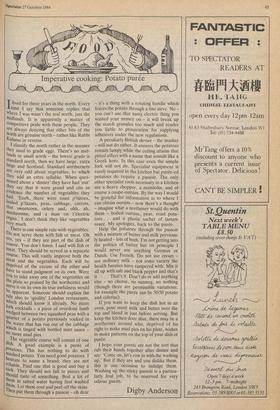Imperative cooking: Potato purée
lived for three years in the north. Every time say that someone replies that Where I was wasn't the real north, just the Midlands. It is apparently a matter of Competitive pride with these people. They are always denying that other bits of the north are genuine north -.rather like Rabbi Kahane in reverse.
I classify the north rather in the mariner they used to grade eggs. There's no mid- lands or small north - the lowest grade is standard north, then we have large, extra large and Scotland. Standard northerners are very odd about vegetables, to which they add an extra syllable. When ques- tioned about a 'dinner' they have had 'out' they say that it were grand and cite as evidence the number of vegetables they had. 'EMI, there were roast p'tatoes, boiled p'tatoes, peas, cabbage, carrots, that sweetcorn, celery and, ohh, ah, Mushrooms, and a man on t'electric organ.' I don't think they like vegetables very much.
There is one simple rule with vegetables. 1)0 not serve them with fish or meat. Oh Yes, yes - if they are part of the dish of course. You don't listen. I said with fish or Meat. They should be served as a separate course. This will vastly improve both the meat and the vegetables. Each will be deprived of the excuse of the other and have to stand judgment on its own. Were You to take away one of the vegetables on the plate so praised by the northerner and serve it on its own its true awfulness would be apparent. Someone should explain the rule also to 'quality' London restaurants, Which should know it already. No more fork cocktails - a piece of overdone lamb Wedged between two squashed peas with a quarter of a potato previously soaked in the water that has run out of the cabbage Which is tinged with bottled mint sauce no more mud pies. The vegetable course will consist of one dish. A good example is a purée of Potatoes. This has nothing to do with Mashed potato. You need good potatoes. I hesitate to name a brand; they are not reliable. Find one that is good and buy a sack. They should not fall to pieces and should taste of something. Boil a lot of them in salted water having first washed ,„them. Let them cool and peel off the skins. 'nen put them through a passoir - oh dear - it's a thing with a rotating handle which forces the potato through a fine sieve. No you can't use that nasty electric thing you wasted your money on - it will break up the starch granules too much and render you liable to prosecution for supplying adhesives under the new regulations.
A peculiarly British device - the masher - will not do either. It ensures the potatoes remain lumpy while the ceiling attains that pitted effect with a name that sounds like a Greek hero. In this case even the simple fork will not do. Specialist equipment is rarely required in the kitchen but purée-ed potatoes do require a passoir. The only other specialist tools necessary in a kitchen are a heavy chopper, a mandolin, and of course a coupe-oursins. By the way I would be grateful for information as to where I can obtain oursins -'now there's a thought - imagine what a northener would do with them - boiled oursins, peas, roast pota- toes . . . and a plastic sachet of tartare sauce. My apologies, back to the purée.
Help the potatoes through the passoir with a mixture of butter and milk previous- ly heated - lots of both. I'm not getting into the politics of butter but on principle I would never use anything German or Dutch. Use French. Do not use cream use ordinary milk - not some variety the health fanatics have tampered with. Mix it all up with salt and black pepper and that's it . . . . That's it. Don't do or add anything else - no cheese, no nutmeg, no nothing (though there are permissible variations: for example the purée can be 50/50 potato and celeriac).
If you want to keep the dish hot in an oven, pour more milk and butter over the top and blend in just before serving. But keep the kitchen door shut, there may be a northerner around who, deprived of his right to make mud pies on his plate, wishes to make patterns on the top of your dish of puree.
I hope your guests are not the sort that rub their hands together after dinner and say: 'Come on, let's row in with the washing up.' But if they are and you dislike them, this is one occasion to indulge them. Washing up the sticky passoir is a particu- larly foul job, to be reserved for very odious guests.
Digby Anderson


















































 Previous page
Previous page